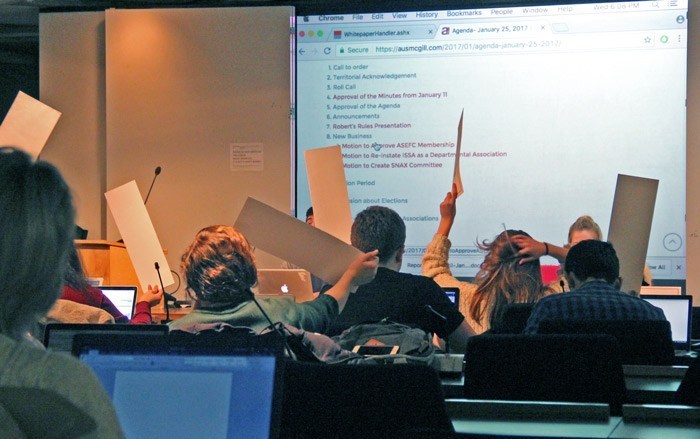On Sept. 18, the Arts Undergraduate Society (AUS) Legislative Council convened to discuss the McGill Senate’s failure to pass a motion to cancel classes on Sept. 27.
AUS General Assembly is called after to senate ruling on Climate Strike
Student’s Society of McGill University (SSMU) Arts Senator Henrique Mecabó presented the Senate’s report to the council, which included insights into the administration’s view on the choice of individual students to participate in climate activism .
“We had a Senate meeting here this afternoon where the only motion moved was by student senators regarding the Climate Strike […] on Sept. 27,” Mecabó said. “McGill […] will not be requiring classes to be cancelled. The administration believes it is an individual choice that each student join or not join the march, and that students who do want to go to class should not be penalized.”
Without the Senate’s support, any motion to strike on Sept. 27 must be handled at the departmental level. Student societies, such as the AUS, would have to vote to strike independently from McGill’s administration.
AUS President Jamal Tarrabain shared that he had been contacted by Climate Justice Action McGill (C-JAM), a student group that lobbies the McGill administration and Canadian government for climate justice. C-JAM presented Tarrabain with a petition calling for a general assembly to vote for an AUS student strike, which may only be convened if more than 200 signatures from arts students are collected.
As the petition met its quota, the AUS will be holding a general assembly on Wednesday, Sept. 25, at 6:00 pm in Leacock 132. Five hundred AUS members must appear at the general assembly to successfully pass the motion to strike. Tarrabain said that the AUS should demonstrate the importance of climate action by standing in solidarity.
“If AUS can come together as a faculty […] and vote for this motion to strike, I think it would send a powerful message to the administration,” Tarrabain said.
AUS council votes to exempt stipulated campus media organizations from recording ban
Tarrabain moved to exempt certain campus media from the audio and visual recording ban, which was put in place after members of the AUS expressed worry that recording would create a hostile environment for councillors. The ban was initially passed in Feb. 2019, in light of the debates over the summer exchange course POLI 339 in Israel.
Brent Jamsa, Vice President External of the Canadian Studies Association of Undergraduate Students (CSAUS) queried as to whether this amendment infringed on students’ individual rights.
“My concern with [this standing rule] is that Quebec is a one party recording [province],” Jamsa said. “I don’t know if it would particularly apply to [Legislative] council, but you only need one party to consent to a recording. There are other free speech implications on that. Was any sort of outside legal counsel or McGill legal counsel consulted when this amendment was added last year?”
Tarrabain confirmed that legal counsel was not consulted when the amendment was drafted and passed, which complicates this debate with issues of individual rights and freedoms within Quebec. Tarrabain motioned to exempt the following campus media from Article 10 of the AUS Standing Rules: The McGill Tribune, The Daily, Le Délit, and the Bull and Bear. The motion passed successfully.
The Legislative Assembly will reconvene on Oct. 2, 2019.








